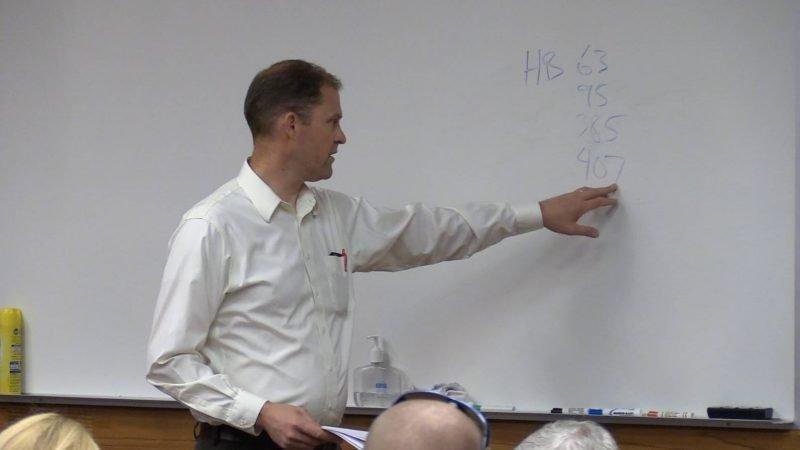Emery County Farm Bureau President Dustin Huntington informed members and invited guests at a meeting last week in Castle Dale that the meeting was being held to discuss policies that would affect the area and state. These policies need to be in place before the state convention in November.
Huntington then turned the time over to Sterling Brown from the State Farm Bureau.
Brown’s first comments were to thank the citizens of the area for electing David Hinkins and Christine Watkins to the state legislature, as they are very approachable and concerned about issues facing rural Utah. He then drew attention to four House bills: 63, 95, 385 and 407. All are public lands related and need the study of the Farm Bureau. They are bills transferring or re-designating federal lands. These bills would turn lands back to the state, make a monument, or state park. Brown called for the FB to strengthen the language of policies on these issues. Senator Hinkins, who had spent the last four days with United States Interior Secretary Ryan Zinke, said that the Secretary is not in favor of the transfer of lands but is in favor of changes in management of the lands.
Brown next spoke to the members about SP214, which is a water related bill. It originated in 1990 and allowed the Division of State Parks and Recreation to purchase in-stream flow rights, which allowed water to be stored until needed. Since that time it has been changed to allow the DRW the same rights. Now, both Trout Unlimited and government entities can also lease in-stream flow rights. The FB was originally in favor of these privileges but now is taking a second look with the new changes. This bill passed the legislature. Farm Bureau concern is to make sure downstream users are not affected.
The next concern was the 1969 Green Belt Law and its recent readdresses. This bill questions the use of agriculture land for multiple uses. In order for land to be eligible for green belt tax status it must meet the following criteria: be at least five acres, have agriculture activity and have a production minimum. Many farmers or ranchers have diversified their lands during different seasons in order to balance their budget. Some county assessors are driving new legislation in this area.
Brown also brought to attention HB 217, a bill concerning animal harassment. This will increase the penalties in these areas of harassment: dogs, drones or motorized vehicles. Interestingly, cattlemen also move their herds using the same three methods.
Huntington then spoke about the open range law and its implications as far as fencing an area and liabilities. Some counties require fencing to keep others out while other counties fence to keep inside. Emery County Commissioner Keith Brady spoke about the fencing along the road at Goblin Valley and liability concerns there. Members felt that the language should be changed to make it more specific.
Other issues of concern for the members included the spread of disease to domestic herds from wildlife, brucellosis and trichinosis, for example. Another concern was the transplanting of deer from the Wasatch front to the local area and the infestation of these herds in local feed yards and even backyards of residences.


